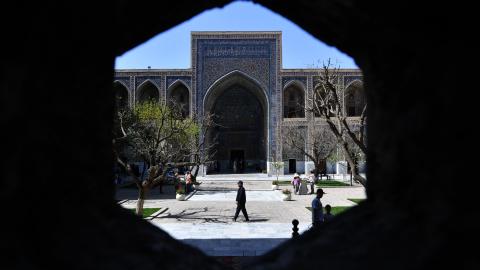A review of Larissa MacFarquhar's __Strangers Drowning: Grappling with Impossible Idealism, Drastic Choices, and the Overpowering Urge to Help__
Larissa MacFarquhar’s subject in “Strangers Drowning” is extreme moral commitment. She is not concerned with the ordinary person who leads a worthy life or performs commendable deeds. Rather, her focus is on those who arrange their lives for the purpose of helping others. Such a person has a “sense of duty that is very strong,” she writes, “so strong that he’s able to repress most of his baser impulses in order to do what he believes to be right.” For want of a better term, Ms. MacFarquhar calls these people “do-gooders.” despite the word’s sometimes demeaning connotation.
Much of the book is devoted to intimate profiles of these do-gooders. In telling their stories, Ms. MacFarquhar examines how they arrived at their ideals and how they went about trying to live up to them. Some of their choices are “tiny, everyday choices,” she writes, “whether to move a worm from a path, whether to buy an apple.” Others are “large and dreadful.” One woman decides that she is willing to risk her life in a dangerous political protest even though her death would mean abandoning her young son. For do-gooders, Ms. MacFarquhar says, “it is always wartime,” when moral considerations can justify behavior that would otherwise be wrong or at least questionable.
There’s Aaron Pitkin, who fights for animal rights, having decided early in life that “animals were more oppressed than people.” Rushing to a final exam in college on a rainy day, he stops to move the earthworms from the sidewalk to the grass lest they be stepped on. Aaron is so committed to his cause that there comes a point when he won’t wash the dishes. He tells his girlfriend, when she complains, that the “time spent washing dishes could be time spent working for animal rights, which were more important.”
Then there’s Julia Wise, who practices extraordinary generosity, keeping her expenses to an absolute minimum so that she can give away most of what she earns. She had once thought about becoming an international aid worker but then realized, Ms. MacFarquhar explains, that the most useful thing she could do was “earn a First World salary and give it to NGOs.”
Julia faces a moral quandary when it comes to having children. She “realized just how enormous a line item a child would be” on her “moral spreadsheet,” Ms. MacFarquhar writes. Children “would be the most expensive nonessential thing she could possibly possess, so by having children of her own she would be in effect killing other people’s children.” Julia eventually overcomes her scruples and decides to have a baby.
Sue Hoag and Hector Badeau are a Christian couple who had two biological children before adopting 20 more. Three of the adopted children were severely disabled, while others were born in poverty or to dysfunctional mothers. The blended family that Ms. MacFarquhar describes seems warm and happy and loving—until the end of the chapter, when we learn that two of the sons ended up in prison and all of the daughters had babies out of wedlock. Did Sue and Hector make a mistake in deciding to take on such enormous parental responsibility? Was it a mistake for the children?
Ms. MacFarquhar, a writer for the New Yorker, has a vivid writing style, and her perspective is unfailingly compassionate, even when she is writing about someone with a particularly loopy worldview. Her subjects emerge as fully human despite personal eccentricities, selfish tendencies and nonstandard ideas about how to live a moral life.
The book’s big disappointment is its avoidance of the tough questions raised by the do-gooders’ stories. Did they make wise choices? Was their altruism effective? Is there something self-indulgent about their severe commitments? Is the world a better place because of them? Ms. MacFarquhar remains resolutely nonjudgmental. “Are all the choices these do-gooders have made the right ones?” she asks. Her answer: “I don’t know.”
Nor does she seem very interested in examining the role that culture and religion may have played in forming an individual’s moral sense, in addition to his personal background and experiences. In essays occasionally positioned between the profiles, Ms. MacFarquhar offers grandiose musings on such topics as utilitarianism and do-gooders in fiction. But there’s scant discussion of the role of Western culture and Judeo-Christian teaching in shaping the principles of the people she profiles, all but two of whom are American.
Some of the do-gooders are maddeningly solipsistic, for all their self-imposed moral standards; others are merely naïve or foolish about what they can expect to accomplish. But a few are genuinely focused on relieving suffering or righting wrongs. I was especially moved by two stories: that of a Buddhist priest in Japan who counsels people with suicidal thoughts, urging them to value life in a society that traditionally honors suicide; and the story of a Methodist minister in inner-city Baltimore who donates a kidney to a stranger. The follow-on essay to the minister’s story is the best in the book. It looks at how our society’s moral expectations regarding kidney donation have changed as medical technology has improved. Now that many transplants are less painful or threatening to the donor, altruism becomes easier, and the ethical calculation has shifted broadly in favor of donation.
It is possible to read “Strangers Drowning” by skimming the profiles until you discover one that interests you rather than beginning on page one and plodding through until the end. Either way, you may find yourself less reluctant than the author to judge the logic and value of extreme do-goodery.

















